

The Journal of Competency-Based Education - Volume 1, Issue 1 - April 2016. 2016 Virtual CBE Summit Sessions. Sessions Setting up a CBE pilot program: Things to consider Anthony Scheffler, Associate Vice President for Academic Affairs, Valdosta State University The long term success of a competency-based education initiative is largely determined during the planning stage.

Preparation for the scaled implementation of a CBE program should be a deliberate and measured effort that is informed by a well-designed pilot process. Using a pilot CBE program at Valdosta State University as a reference, a number of functional and contextual considerations, as well as lessons learned, will be presented as a basis for the development and implementation of a CBE pilot. Exploring the Instructional Design Model and Process for the UW System’s Flexible Option.
Education Dept. Approves Two More Direct-Assessment Programs. QM How to Design Standards-Based Online Courses. Online Learning How to Design Standards-Based Online Courses Two universities share how the Quality Matters rubric informs their online course design and improves the learning experience for students.
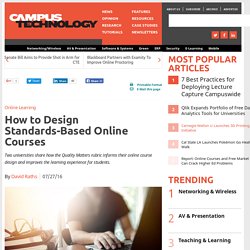
Mary Chayko, a professor in the School of Communication and Information at Rutgers University (NJ), has taught both hybrid and fully online courses for several years. In 2014, as she was designing a new course, Chayko realized she wanted to make the experience more seamless for students, so she turned to Denise Kreiger, a Rutgers instructional design and technology specialist with experience using the Quality Matters (QM) framework for online courses. Many faculty members struggle when they initially make the transition from face-to-face to online and hybrid settings, and that is where QM can help — by laying out course design principles for improving student learning, engagement and satisfaction. Mapping the Competency-Based Education Universe - Eduventures. By Brian Fleming, Senior Analyst Competency-based education (CBE) is gaining momentum, and higher education leaders are taking note of this unique market opportunity.
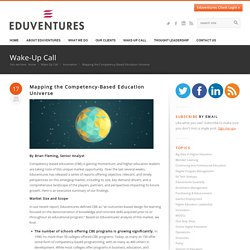
Over the last several weeks, Eduventures has released a series of reports offering objective, relevant, and timely perspectives on this emerging market, including its size, key demand drivers, and a comprehensive landscape of the players, partners, and perspectives impacting its future growth. Here is an executive summary of our findings. Market Size and Scope In our recent report, Eduventures defined CBE as “an outcomes-based design for learning focused on the demonstration of knowledge and concrete skills acquired prior to or throughout an educational program.” The number of schools offering CBE programs is growing significantly. Mapping Out the CBE Landscape Using this resource will help you: Determine the right approach to CBE, and the optimal delivery model(s) to avoid the costly mistake of pursuing the wrong approach.
CBE Interest High in Higher Ed; Complexity Holds Back Activation. Competency-Based Education CBE Interest High in Higher Ed; Complexity Holds Back Activation By Dian Schaffhauser07/27/16 Almost every university or college has some level of interest in providing competency-based education (CBE) of some form.

The primary motivator for their interest is delivering access to "non-traditional" learners, followed by a desire to improve completion rates and address workforce needs. CBE offerings are especially of interest to non-traditional students; nearly twice as many adult students as traditional-age students enroll in CBE courses. Those are a few of the findings in a new CBE report based on survey results from 251 American institutions, including responses from "CBE advocates, skeptics and everyone in-between," as the report's authors wrote. D2L Getting Started with CBE Guide. D2L CBE Assessment Guide. 5 Key Qs about CBE: Learners Become Masters. Walden Expands Competency-Based Master's Program. Competency-Based Learning Walden Expands Competency-Based Master's Program By Dian Schaffhauser04/14/16 A university that already offers one master's degree that uses competency-based learning has just added two more.
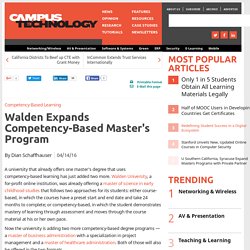
Walden University, a for-profit online institution, was already offering a master of science in early childhood studies that follows two approaches for its students: either course-based, in which the courses have a preset start and end date and take 24 months to complete; or competency-based, in which the student demonstrates mastery of learning through assessment and moves through the course material at his or her own pace. Now the university is adding two more competency-based degree programs — a master of business administration with a specialization in project management and a master of healthcare administration. The competency approach is being delivered under Tempo Learning, a Walden structure that follows an "all-you-can-learn" model. About the Author. Onlinelearningconsortium. (CBE) Report: Doing a Deeper Dive OLC. Competency-based Education (CBE) Competency-Based Education: A Framework for Measuring Quality Courses, Online Journal of Distance Learning Administration, Spring 2015.
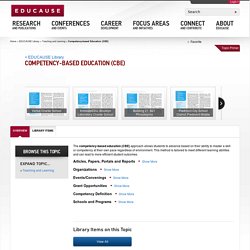
The authors state the purpose of this paper is to provide background and research for a proposed rubric to measure quality in competency-based online courses. Got Skills? Why Online Competency-Based Education Is the Disruptive Innovation for Higher Education, EDUCAUSE Review Online, November 10, 2014. Online competency-based education can even out the playing field by taking students to the furthest point possible in their learning experiences, regardless of their starting point, race, geographical location, or family income. Beyond the MOOC Model: Changing Educational Paradigms, EDUCAUSE Review Online, November 10, 2014.
Report: Competency Ed Needs To Show 'Credible Evidence' To Prove Validity. Research Report: Competency Ed Needs To Show 'Credible Evidence' To Prove Validity By Dian Schaffhauser05/20/15 While many competency-based education (CBE) programs do a decent job of documenting the competencies students need to master and the types of assessments used to measure student proficiency, that doesn't go far enough, according to a new report on the topic of assessment in CBE.
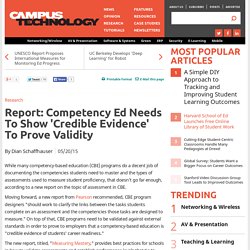
Moving forward, a new report from Pearson recommended, CBE program designers "should work to clarify the links between the tasks students complete on an assessment and the competencies those tasks are designed to measure. " On top of that, CBE programs need to be validated against external standards in order to prove to employers that a competency-based education is "credible evidence of students' career readiness. " The new report, titled, "Measuring Mastery," provides best practices for schools in how to validate assessments and establish performance levels that tie to "real-world mastery.
"